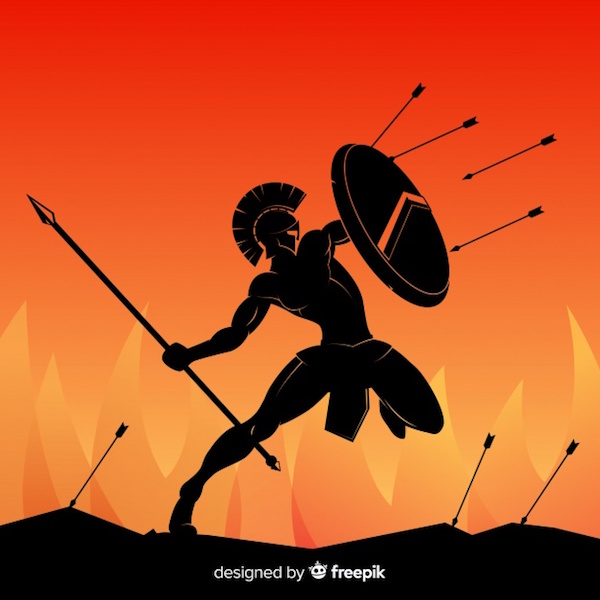
The best definition of leadership I have ever seen is “a leader is someone others willingly follow.” When you are seen as a leader there is great responsibility that goes with this new stature.
I read a wonderful quote recently, attributed in the source as Alexander the Great: “I am more afraid of one hundred sheep led by a lion than one hundred lions led by a sheep. ”
Of course there are a million and one quotes on leadership. I enjoy reading most of them because I am keenly interested in human behaviour and what real leadership is all about.
If someone has to call themselves a leader to validate their position, I doubt they are a real leader. Just like in advertising or other corporate messages that state “we have the best customer service.” I never trust that one.
So, how can you distinguish the real leaders from the fake leaders?
In Steven Pressfield’s fantastic book, Gates of Fire, about the battle of Thermopylae (remember the movie 300, this is much better), there is a paragraph near the end of the book where Xeones, the Spartan who survived the battle and recounted the story of the Spartans to the Persian King, describes what a king is. If you change king to leader, I believe we have a terrific definition:
“A king does not abide within his tent while his men bleed and die upon the field. A king does not dine while his men go hungry, nor sleep when they stand at watch upon the wall. A king does not command his men’s loyalty through fear nor purchase it with gold; he earns their love by the sweat of his own back and the pains he endures for their sake. That which comprises the harshest burden, a king lifts first and sets down last. A king does not require service of those he leads but provides it to them. He serves them, not they him.”
You can unpack this quote sentence by sentence and think of books that have been written on each line, including:
- Leaders eat last: why some teams pull together and others don’t, by Simon Sinek
- The dichotomy of leadership: balancing the challenges of extreme ownership to lead and win, Jocko Willink and Leif Babin
- The servant as leader, by Robert Greenleaf (actually an essay that spawn his book on servant leadership.
And there are numerous writings by Harvard Business Review, professors at many leading institutions, and other leadership experts like James Covey, John Maxwell, Marshall Goldsmith and others. And of course sports books from successful coaches, players, and summaries of great teams.
Leaders must often make tough decisions. In fact, their employees count on them to make the tough decisions. Inaction is often seen as a debilitating weakness of a leader.
Kouzes and Posner, in their seminal work in The Leadership Challenge talk about the power of love that a leader can show. I am not referring to someone who constantly cries, or is overly emotional all the time. I see that as weakness.
They are referring to a genuine love and respect for their people and know that it is an honour to serve them. And I agree. Leaders are accountable to themselves first and then their customers – both internal and external. This can be a weighty responsibility. And it is why not everyone is cut out for a leadership role. Not everyone wants this responsibility all the time. Leadership is a 24/7 quality now in this age of social media where every moment is captured and sent around the world.
And this is where problems can arise. Just ask the Ottawa Senators where a few players were caught in an Uber making disparaging comments about their coach and organization. Some players were “team leaders.” I wonder…
Leonidas, King of the Spartans at the Battle of Thermopylae is presented as that leader who will do everything that his army will do. He leads into battle. He doesn’t watch safely from the rear. During history, almost all of the well-respected military leaders were in the front lines as much as their troops. Think Cromwell, Attila the Hun, Rommel, Patton, Lord Nelson…
Remember that a leader is someone others willingly follow.
Your character as a leader, first and foremost, is the most important foundation. I am a big fan of Wooden’s Pyramid of Success and Vince Lombardi’s approach to leadership and team play. The final word today comes from the book Legacy: What the All Blacks can Teach us About the business of Life. The author, James Kerr, spent time with this legendary rugby team to compile 15 characteristics (there are 15 players on the pitch) that are the basis of the book. The first is character and the quote used is “Successful leaders balance pride with humility: absolute pride in performance; total humility before the magnitude of the task.”
--
About the Author
Tim Kist is a Certified Management Consultant (CMC), whose certification was obtained through a combination of experience, examination and continuous professional development. With over 20 years of senior industry management, combined with nearly 8 years in management consulting with national firms, Tim brings together extensive experience, objectivity, and front line leadership. As a national athlete and current university football coach, Tim lives and understands the evaluation, preparation and game planning required for successful high level individual and team performance. He has successfully brought this coaching approach to his work teams throughout his leadership career. Read More
--
A version of this post was first published here.



